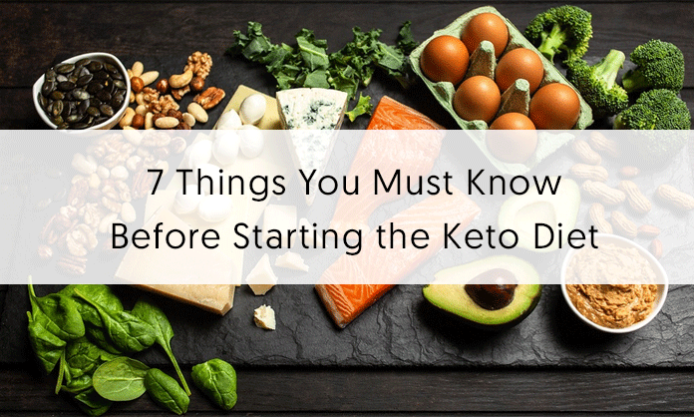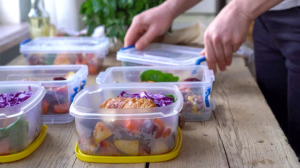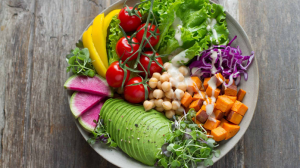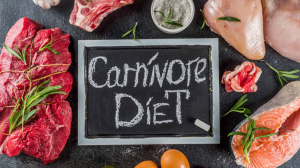Table of Contents
Are you planning to jump to a high-fat, low-carb diet in the near future? Starting the keto diet and following the regimen long enough to see visible weight loss results can be tough.
After all, jumping to the keto diet is a radical departure from your current eating habits. People who turn to the keto diet without gathering the required information from trusted sources give up within weeks. You should not make that mistake.
Here in this post, we will shed light on the seven most important things you should know before starting the keto diet.
You Have To Cut Down On Carbs
According to the Nutrition Factsheet from the National Center for Health Statistics, a person gets nearly 50% of their calories from carbohydrates on an average.
When you start with the ketogenic diet, you need to cut it down to 5-10%. This is a big change in how you eat, what you eat, and how much.
Many people, who get excited upon reading about the results of the keto diet, are not mentally prepared for this change.
You need to eliminate grains, sugar, pastries, soda, starchy vegetables, etc. from your daily diet. Over the course of the day, you can consume just about 40-50 grams of carbs – less than the approximate amount of carbs found in a medium, plain bagel.
The keto diet – food and drinks included – typically involves a 4:1 ratio of fats: carbs.
You May Also Need to Keep Protein Consumption under Control
Popular ketogenic resources recommend 10-20% calorie intake from proteins. Therefore, in the ketogenic diet, protein consumption should also be moderated.
Amino acids in protein can get converted into glucose. So, you need to moderate your protein intake so that you can maintain lean body mass (including muscle). But, eating too much protein can knock you out of ketosis.
There Is No Standard Keto Diet Template for All to Follow
According to a diet review published by Harvard School of Public Health, the exact ratio of carbohydrate, fat, and protein, required to achieve the desired health benefits from the Ketogenic diet varies among people depending upon their body composition and generic markup.
So, it is recommended that you consult your dietician and physician before starting with the keto diet. You may need expert help in –
- Monitoring biochemical changes after you begin with the ketogenic diet
- Preparing a keto diet meal plan that is tailored to your body composition and unique health conditions
A dietician can also help you choose a meal plan that reduces the possibility of nutritional deficiencies or health complications in the near future. Some people may also need professional guidance on how to reintroduce carbs in their diet once they have lost weight.
You Need to Take Supplements
A high-fat diet isn’t a great source of minerals and vitamins. Pure fats such as olive oil, coconut oil, butter, etc. will not meet your daily requirement of vitamins and minerals. Your body may also be missing out on antioxidants that are found in fruits and root vegetables. So, you will need to consider taking supplements for these nutrients.
Many people also take supplements to increase the rate of weight loss. Garcinia Cambogia based supplements, for instance, are often taken in order to block the formation of body fat, boost the metabolic rate to increase calorie burn rate, and suppress the appetite.
Know What Side Effects to Expect
There is one major side effect you should expect – the keto flu.
The keto flu is a collection of symptoms associated with your body trying to adapt to the ketogenic diet. During the keto flu, your body is transitioning from burning sugar to burning fat for most of its daily energy requirements.
Common symptoms of the keto flu include constipation, headaches, foggy brain (difficulty focusing), nausea, fatigue, muscle cramps, irritability, difficulty sleeping, sugar cravings, etc.
Contrary to its name, the keto flu does not resemble a fever and the symptoms won’t make you incapacitated. However, if you feel very sick, consider visiting your doctor for some unexpected changes that might have taken place.
You will need to increase your salt and water intake to reduce these symptoms. Your kidneys will excrete more electrolytes and water when your body is in ketosis. So your body will need more sodium and potassium to function properly. You can season your food with salt, or eat non-starchy vegetables such as arugula, kale, asparagus, bell peppers, etc.
Some people may need to eat more fat to reduce the symptoms of keto flu.
Some dieters may end up with digestive issues when their bodies are low on carbs. So nutritionists recommend including coconut, nuts, chia seeds, flax seeds, low-carb vegetables, etc. in the diet.
Pick a Suitable Time for Starting the Keto Diet
Most people feel extremely lethargic in their limbs (generally due to the keto flu) during the first 7 to 10 days when they start with the ketogenic diet. You may have difficulty climbing upstairs or have a hard time concentrating on anything.
So, you need to pick a start date for the keto diet when your schedule isn’t too busy.
Choose a timeframe when you can relax without having to worry about deadlines, obligations, etc.
You Need to Start Cooking At Home
Eating out is hardly an option when you are on the ketogenic diet. The keto diet bars commonly available foods such as pasta, bread, ketchup, etc. Most processed and packaged foods, too, are not to be consumed by a dieter. So, you will need to make time to cook your own meals.
There are tons of recipes for keto dieters on the Internet.
Pick at least five or six recipes with foods you know you will like to eat. This way, you will not run out of options on what to eat. Many people turn to carbohydrates as soon as they have difficulty finding suitable foods.











